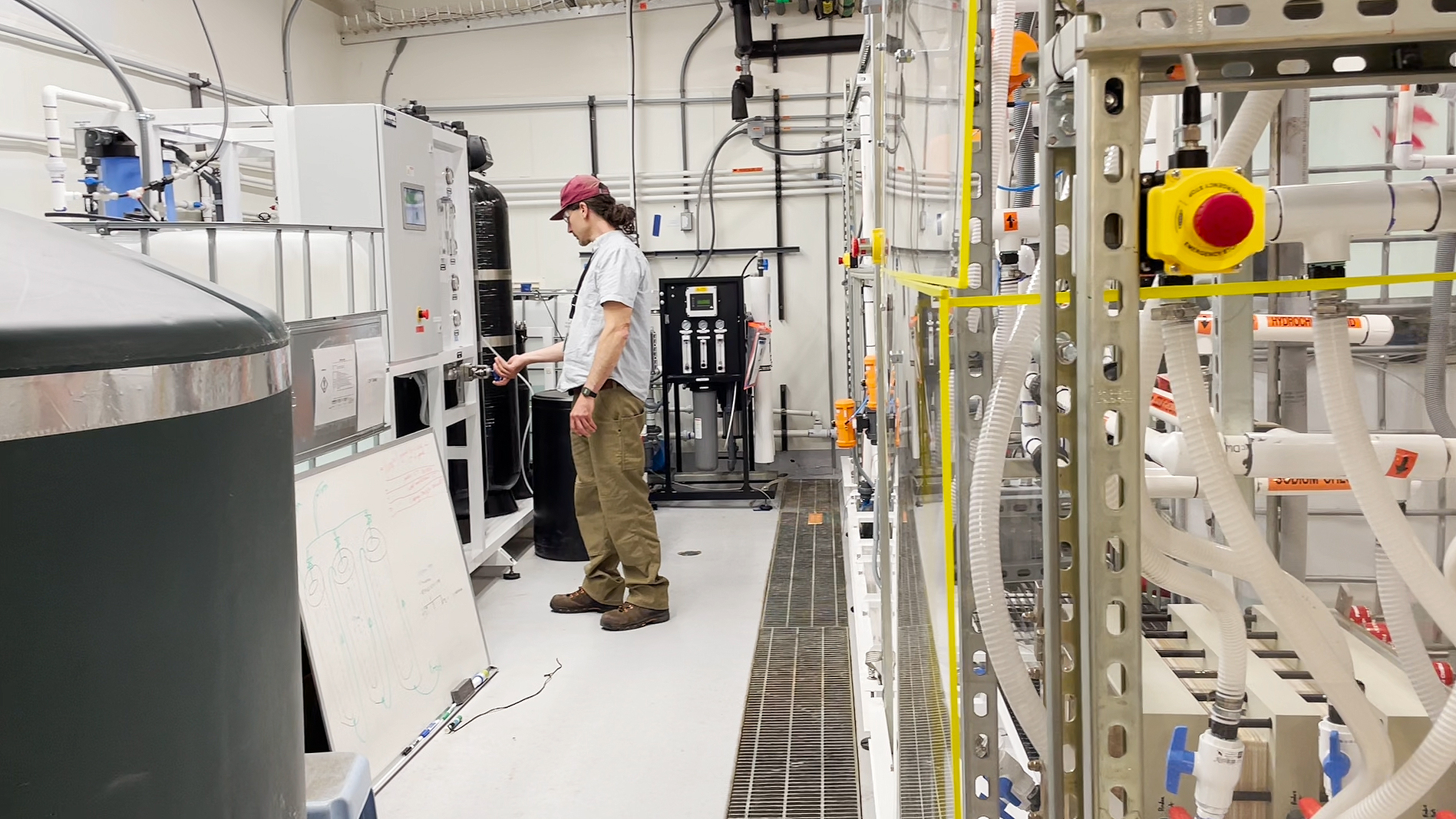
Ebb Carbon – a climate technology startup founded by former Google X, Tesla, and SolarCity execs – has installed and begun operating its first marine carbon dioxide removal (mCDR) and ocean deacidification system at the Pacific Northwest National Laboratory (PNNL) facility in Sequim, Washington, marking an important step as the company begins to deploy its technology following a recent Series A investment round.
Ebb is taking a measured, science-based approach to its first deployment, partnering closely with some of the world’s most respected ocean monitoring and modeling institutions to gather and publicly share data about its technology. This approach is generating real-world, scientifically validated data that will provide visibility into Ebb’s carbon-removal process and provide a strong foundation of understanding to support responsible future deployments of this critical climate solution.
The collaborative partnership includes the U.S. Department of Energy’s Pacific Northwest National Laboratory – Sequim (PNNL-Sequim), the National Oceanic and Atmospheric Administration’s Pacific Marine Environmental Laboratory (NOAA/PMEL), the NOAA Cooperative Institute for Climate, Ocean, and Ecosystem Studies (CICOES) and the Salish Sea Modeling Center, both at the University of Washington. Funding support is being provided by the NOAA Ocean Acidification Program (OAP), the U.S. Department of Energy’s Water Power Technologies Office (WPTO), and the ClimateWorks Foundation.
“Given the realities of climate change, we must act quickly to deploy solutions to remove excess CO2 from the atmosphere,” said Ben Tarbell, CEO of Ebb Carbon. “It’s equally important that we do this in a way that is transparent and facilitates public dialogue so that scientists, researchers, policymakers, and communities have visibility into the process. We welcome the opportunity to work with some of the world’s leading scientists and researchers as we begin to scale our technology.”
Ebb’s first system, which is roughly the size of a shipping container, processes seawater that is pumped into PNNL-Sequim’s marine lab from Sequim Bay. The seawater passes through a series of membranes, which act like a filter, removing acid from the water. Once the acid is removed, the seawater can absorb additional carbon dioxide from the air and store it as bicarbonate in the water. Bicarbonate is a durable and naturally abundant form of carbon storage in the ocean.
Before returning to the ocean, the treated seawater will be held in open air tanks to facilitate research, experimentation and simulation to document the impacts of the process on CO2 sequestration, ocean deacidification, and local biology. The treated seawater will return to the ocean through PNNL’s existing wastewater system in accordance with existing permits. The research team is also evaluating the potential to power the Ebb system using marine energy including energy from ocean waves, tides, currents, as well as salinity, thermal and pressure gradients.
The low-carbon acid that Ebb’s system produces can be used to neutralize alkaline waste locally. Ebb is in discussions with local sand and gravel operations who can utilize the acid to neutralize alkaline stormwater.
Ebb’s system in Sequim Bay has the capacity to remove up to 100 tons of atmospheric CO2 per year but will operate at a reduced capacity to allow for research by Ebb and its scientific partners. The system is designed to run intermittently, allowing it to leverage intermittent, low-carbon energy by ramping up and down based on the availability of local renewable energy sources.
Ebb’s technology is designed to speed up a natural process that restores ocean chemistry by neutralizing excess acidity. This increased acidity is the direct result of human-generated CO2 emissions over the last 200 years, and threatens marine ecosystems. Ebb’s process of deacidification not only restores ocean chemistry; it also enables seawater to safely draw down atmospheric CO2 by converting it to bicarbonate – the ocean’s natural storage solution for CO2 – without adding additional acidity. At scale, Ebb’s technology can play a meaningful role in removing already-emitted CO2 from Earth’s atmosphere – an estimated 6-10 billion tons of which will need to be removed each year until 2050 in order to meet climate targets (in addition to large-scale decarbonization efforts).
This first deployment of Ebb’s system comes shortly after the company announced its Series A investment round. Since that announcement in April, Ebb has added a number of additional funders to the round, including the Chan Zuckerberg Initiative (via a strategic program investment) and Propeller.
Partner Quotes
“We hope Ebb Carbon’s technology could help remove CO2 from the atmosphere as well as ease ocean acidification locally,” said Brendan Carter, a University of Washington research scientist working with NOAA’s Pacific Marine Environmental Laboratory on seawater carbon chemistry. “We are excited to test the method at the PNNL facility.”
“Although rising temperatures are harming oceans, oceans are a powerful ally in combatting climate change,” said Jan Mazurek, Senior Director of Carbon Dioxide Removal, ClimateWorks Foundation. “ClimateWorks is pleased to join federal partners and the University of Washington to ensure that emerging marine carbon dioxide removal approaches are safe to marine life, coastal communities, and Indigenous peoples, and help foster conditions for ongoing innovation that creates new clean energy jobs.”
Source
Ebb Carbon, press release, 2023-08-21.
Supplier
ClimateWorks Foundation
Ebb Carbon
National Oceanic and Atmospheric Administration (NOAA)
NOAA Pacific Marine Environmental Laboratory PMEL
Pacific Northwest National Laboratory PNNL
Tesla
University of Washington
Share
Renewable Carbon News – Daily Newsletter
Subscribe to our daily email newsletter – the world's leading newsletter on renewable materials and chemicals









